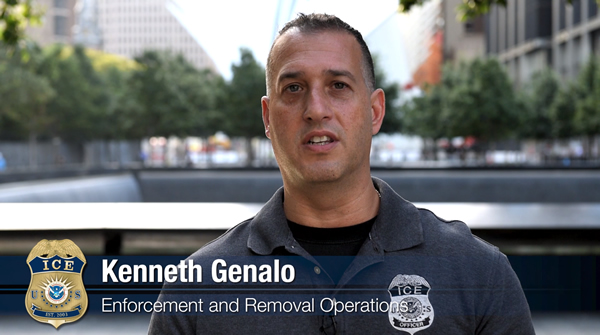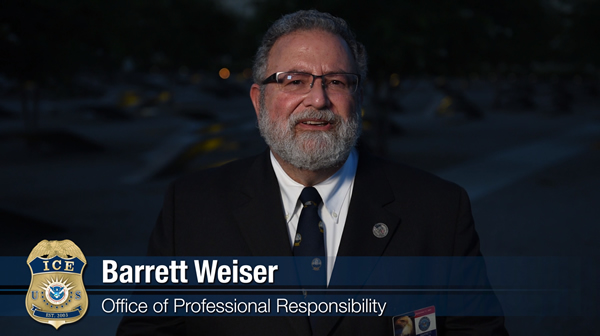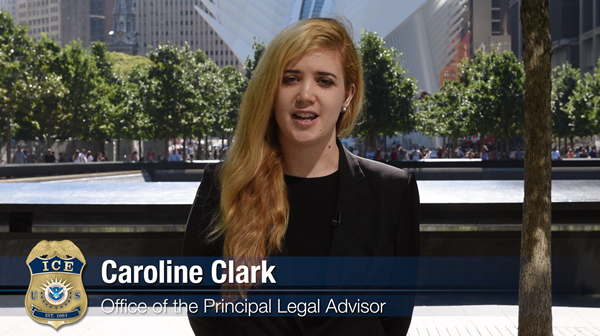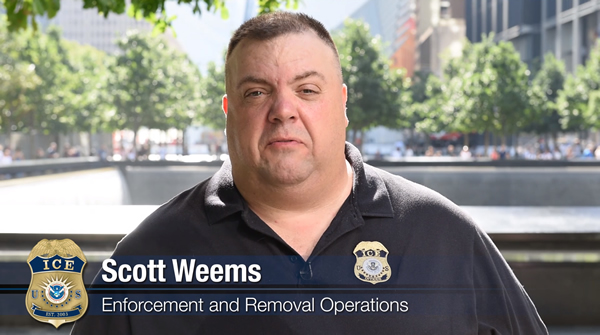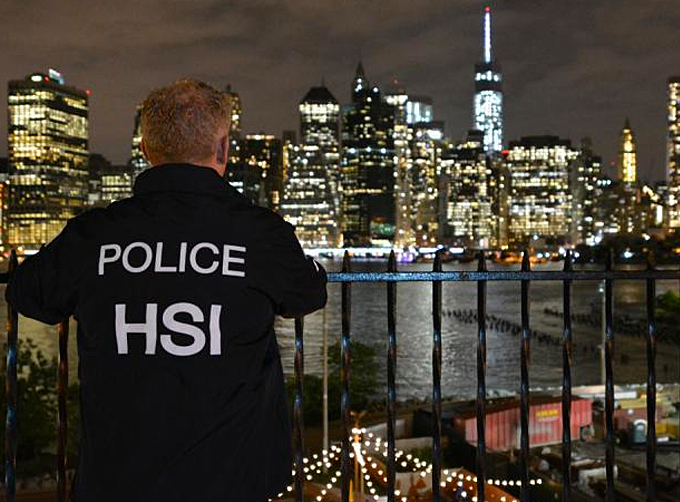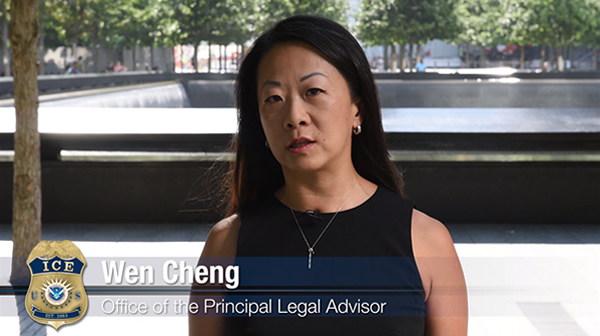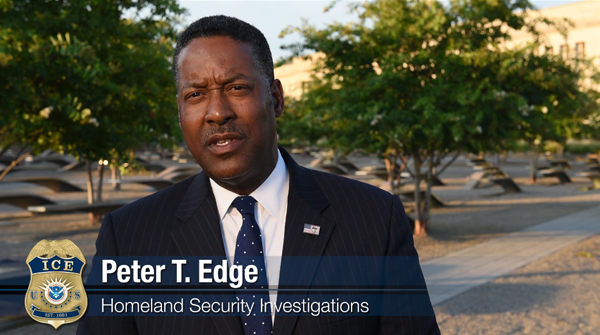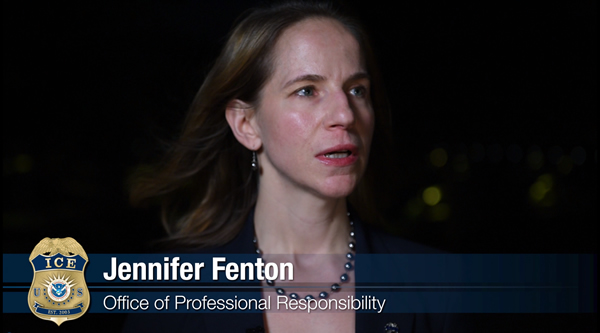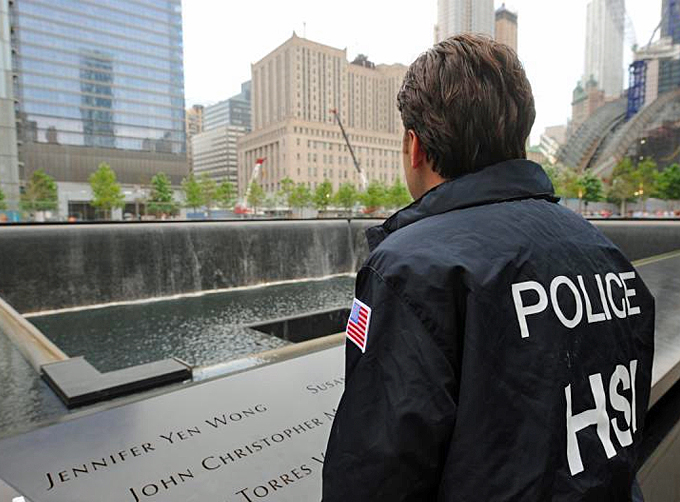
For ICE employees, the prevention of another 9/11 is the reason many go to work each day.
The very existence of the U. S. Department of Homeland Security, and ICE, is the result of the worst terrorist attack on American soil.
The motivation and commitment of ICE employees is tantamount to the agency’s continued success safeguarding the American people and countering terrorism.
These are some of their personal stories from 9/11.
Ken Genalo: #WhyIServe
Ken Genalo vividly recalls the scene at Ground Zero fifteen years ago as a volunteer first responder with the legacy Immigration and Naturalization Service’s Special Response Team in Newark, New Jersey: the turmoil, the smoke, the smell of burning in the air.
Inspiration in the form of the camaraderie among the law enforcement community whose members rushed into the devastation without hesitation.
“We were all there; it didn’t matter what state we were from, it didn’t matter what agency we were from – local, state, or federal – everyone left what they were doing in order to come here and help the City of New York in a time of great need,” he said.
Inspiration in the form of his motivational message to his current employees.
“I use 9/11 as a motivational factor for myself, in the way that I preach my supervision to my delegates, my subordinates, my managers.”
“And I want them to also use 9/11 as a motivational factor because it shows how important that the job and the mission is for ICE ERO to keep the homeland safe.”
“And the bottom line is that we must protect the people of the country, and then at the end of the day we all must go home to our families.”
And finally, inspiration in the form of personal pride to work for ICE.
“I’m 25 years with the Immigration Naturalization Service beforehand, and now ICE ERO,” he said.
“I’m very proud of the job. It’s an important job that we do. And a lot of it is to keep the country safe, keep the people of the United States safe, and to protect them from terrorism, protect them from public safety issues, criminals …”
Barrett Weiser: #WhyIServe
“On 9/11 I was having breakfast with a Pearl Harbor survivor and he said to me, ‘This will be your generation’s Pearl Harbor.’ And I sincerely believe that,” he said.
Barrett Weiser, now a section chief with ICE’s Office of Professional Responsibility, was a Naval reservist on active duty at the time of the attacks.
Weiser worked in recovery and salvage of the Pentagon site working with the FEMA logistics team.
His job was to stabilize the building, recover bodies, and help those who needed it.
He later moved to the Pentagon Family Assistance Center, located in Arlington, Virginia, where he helped care for the families of the people killed on 9/11, whether they were from American Airlines or from the Pentagon.
He recalled the strength of the families he worked with: “I was honored and privileged to work with them.”
“These families took the tragic and sudden loss of their loved ones with so much grace and so much elegance.”
“Probably other than being a parent, it was the most rewarding experience in my life.”
Weiser reflected on the significance of the 9/11 memorials:
“The Rabbis tell us when you’re born, your book of life is opened. And all the years of your life the angels write in that book but your book doesn’t close when you die.”
“It stays open as long as one person remembers your name. And these memorials help us to remember these people’s names.”
Caroline Clark: #WhyIServe
Caroline Clark was in eighth grade on 9/11 but remembers her mother crying and the general confusion of the day.
“I think as a millennial, the world changed for us in the way of insecurity.”
“Because growing up, world history classes, American politics classes had to be changed.”
“And to understand that the United States wasn’t the world superpower, that we could be attacked in our homeland just like Pearl Harbor. It was a weird time to grow up.”
The impact of 9/11 was a large influence on Clark’s career choice, “I decided in law school that national security and immigration were the subjects that were the most interesting to me.”
She uses the impact of 9/11 to inform her daily work with ICE as an immigration attorney with OPLA.
“Every day when I go into the courtroom I’m able to make arguments for the United States about how this individual can pose a threat to national security, how this individual can harm our community, why their criminal records are serious, and why they need to remain detained while they pursue their immigration case before an immigration judge.”
Scott Weems: #WhyIServe
On 9/11, Scott Weems was assigned to the Buffalo Federal Detention Facility in Batavia, New York, as a detention enforcement officer.
As an officer in New York City, Weems was used to hearing about accidents involving aircraft in the City so he was not alarmed when he first heard about a plane hitting the World Trade Center.
“On a cloudy overcast day sometimes the tops of the Towers would be covered by clouds and fog cover.”
“I just assumed it was a small plane that lost its way and might have clipped the Tower.”
He started to watch the coverage on television and said to himself, “That was not a small plane. It was an airliner.”
Weems often thinks of the generational impact 9/11 will have on future Americans.
“I think about the children,” he says.
“I think about the children that were in the classroom with President Bush and the children who survived their parents and their brothers and their sisters and I imagine it’s hard to have to live your life under that kind of shadow.”
As a then-detention enforcement officer, one thing Weems said he will never forget were the detainees, both immigration detainees and U.S. Marshal prisoners facing sentencing that came up to him in the days that followed, asking if they could give blood or help by digging at Ground Zero.
“Of course it was not allowed at the time, but it struck me that at one of America’s most dire moments, individuals that we were in the process of separating from their families and moving from this country, or about to be incarcerated because of criminal offenses they committed, were still offering to help those in need,” he said.
Wen-Ting Cheng: #WhyIServe
“A loud boom behind me” is how Wen-Ting Cheng experienced 9/11. She was in her office which faced the World Trade Center from the northeast.
The terror she felt while evacuating her building was palpable.
She remembers; “There were people everywhere, there was a lot of chaos and confusion.”
Despite the building being on fire, Cheng did not think that the Tower could come down.
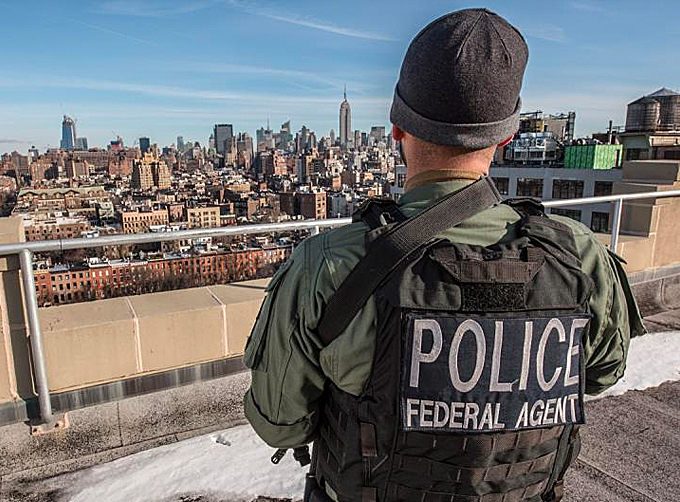 Wen-Ting Cheng is the chief counsel for Office of the Principal Legal Advisor (OPLA) in New York City.
Wen-Ting Cheng is the chief counsel for Office of the Principal Legal Advisor (OPLA) in New York City.
“There was certainly a feeling that life as we knew it would never be the same again,” she said.
She strongly felt that she wanted to do something to help.
“I certainly had a feeling that I had to do something.”
“I had been with the federal government for several years at that point, but what working for the government meant to me before 9/11 and after 9/11 were two entirely different things.”
“After 9/11, the pride that I had in working for the government has carried me for the following decade and a half.”
She said it’s driven her to be the best that she can be in her career and seek new challenges.
“It’s given me the perspective to realize that, you know, what I do on a daily basis is immensely important.”
“And I’m part of a fabric, a greater web of law enforcement that protects the people of the United States.”
“What carries me through is knowing how what I do makes a difference – a very big difference. Working for ICE is a tremendous source of pride for me,” she said.
EAD Peter Edge: #WhyIServe
Peter Edge, Executive Associate Director of HSI, remembers a perfect day on 9/11.
He decided to take the morning off and spend time with his young daughter.
Working in the extreme heat had an unexpected consequence. “All the agents in my group found ourselves walking funny.”
“Our soles had melted a little bit from the heat of the pile.”
While there were some surprises, employees had prepared for emergency circumstances.
EAD Edge described how his colleagues had special training: “We were very lucky because in 1993 when the World Trade Center was bombed, there was a lot of smoke.”

And after that, we practiced regular drills, fire drills, and evacuation drills from that building. So our people in the office were very used to the evacuation process.
“We were very fortunate that we didn’t lose anybody that day.”
EAD Edge described what motivates him to serve the ICE mission and public: “A commitment to my fellow man. I mean—we are here to serve and protect.”
“We take an oath as law enforcement officers, and it’s very important to recognize that oath and act upon it. That rolls into working together and being a team.”
“And never forgetting that, you know, you don’t do this job by yourself. Our job is to go into harm’s way when everyone is evacuating.”
Jennifer Fenton: #WhyIServe
The fact that her mother was supposed to be at the Pentagon gives Jennifer Fenton, ICE’s Inspections and Detention Oversight Division director, a lot to think about when it comes to 9/11.
“She was supposed to be at the building; my mom should have been at the Pentagon,” she recalled.
Her mother was delayed in getting to the office and was not there when the plane hit.
Fenton was a law student on 9/11 and in her shock learning about the attack on the Pentagon, she realized her mother’s old office space was located where the plane hit.
She remembered; “The wedge that ultimately was hit was her office space; that was my mom’s office space.”
Waiting for news about her mother was difficult. “We waited, and waited, and waited over four hours to hear from my mom.”
She had to walk back to Crystal City to her office. She made it back and the first thing she did was call me.”
Fenton strongly believes in the strength of ICE and how it continues to expand its mission.
“The mission of the department and of the agency is unparalleled.”
“I come from a place where I know this work is hard and it can be trying, but the benefit that we bring to this country in an effort to prevent what almost happened to me that day is significant.”
“Never again; not on my watch.”
Original post https://www.ice.gov/features/WhyIServe
(American Security Today would like to take this opportunity to Give Thanks to the employees of ICE, and commend each and every one of you for the amazing job you do every day – to keep our Nation safe. As the proud mother of a United States Marine I have a rare view into the tremendous effort and sacrifice our nations protectors are called upon to give. Words cannot express the depth of our gratitude. God Bless You. Respectfully, Tammy L. Waitt, Editorial Director, AST)













